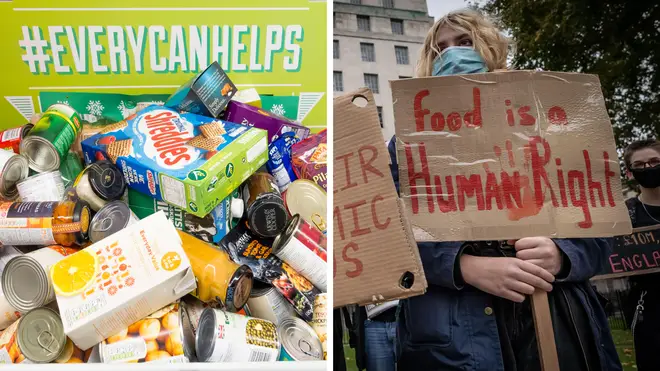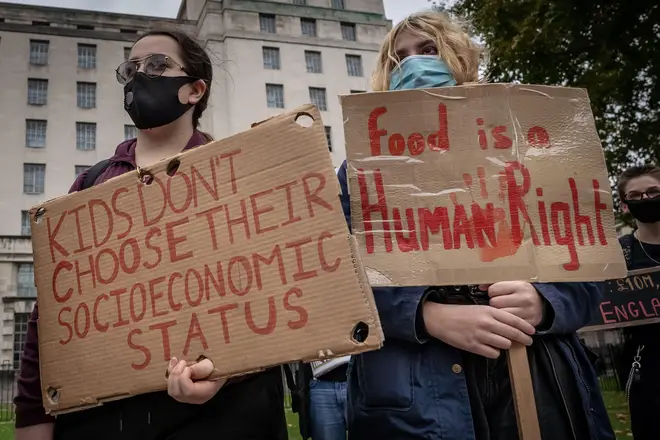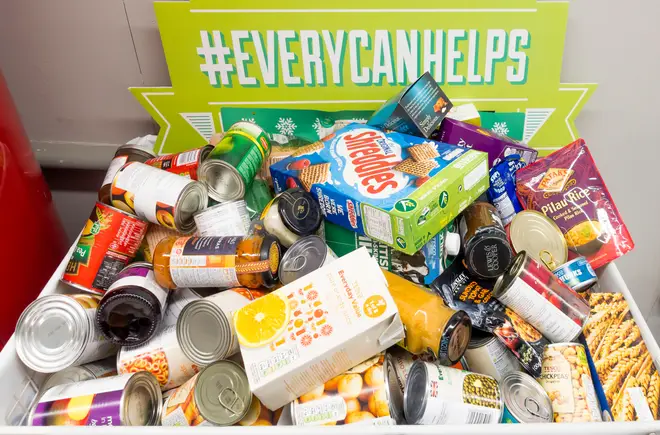
Richard Spurr 1am - 4am
9 May 2022, 10:20 | Updated: 11 May 2022, 09:44

A poverty expert has warned "society is failing in a fundamental way" after a charity found more than two million people were going whole days without eating.
The Food Foundation found the number of people struggling to buy food rose by 57 per cent in three months.
Now 7.3 million adults live in households affected by food insecurity, including 2.6 million children, the charity's research suggested - and more than two million people have gone a whole day without eating over the past month.
A poverty expert said the figures showed "society is failing in a fundamental way", and Food Foundation executive director Anna Taylor said the data demonstrated "a much faster and steeper deterioration than we were expecting".
She said that, whilst the dire situation was preventable, it would "undoubtedly get worse" unless the Government intervened.
Read more: Man in hospital after attempt to heat London home with timber to avoid soaring bills
Read more: Revealed: Struggling families see energy bills soar by 350% in cost of living 'loophole'
"We know that the fuel prices are expected to go up in the autumn again," she told LBC's Nick Ferrari at Breakfast.
"I really hope that over the summer period when people don't need to put their heating on that will give them a small period of reprieve from the intensity of those bills, but it's undoubtedly going to get worse unless measures are put in place."
She went on: "This is an eminently preventable situation.
"We saw that during the pandemic the Government - in its words - wrapped itself around people and protected them and we saw food insecurity levels, they were very high at the beginning and then they really reduced through the period of the pandemic, and now the situation has got extremely bad again and the Government needs to really think about that mix of responses."

The research suggested one in seven adults in live homes where people have skipped meals, eaten smaller portions or gone hungry all day because they could not afford or access food.
It means 7.3 million people are struggling with food insecurity - up from 4.7 million in January.
The "chilling" figures come at a time when the cost-of-living crisis is increasingly hitting families who are facing rising utility and food prices, which are outstripping the amount by which benefits have risen.
Read more: Rattled Starmer pulls out of major speech amid Beergate 'hypocrisy' claims
Read more: Desperate Putin tries to rally Russia as Victory Day broadcast hit with anti-war message
The charity said food bank users are increasingly requesting items that do not need cooking because they are worried about how they will afford rising energy bills.
It came after energy firm Scottish Power urged Chancellor Rishi Sunak to take action to tackle rising bills, warning the price cap could hit £2,900 in the autumn - £1,000 than what it is now, which is already too much for many.
The Food Foundation warned that people will become more reliant on lower cost foods, which tend to be "calorie-dense and nutrient-poor", which will risk their health and increase obesity levels.

Boris Johnson speaks on cost of living crisis
The research flagged other factors affecting families' vulnerability to food poverty.
People in households where someone has a disability and non-white ethnic groups have a higher risk of food insecurity.
There has also been a rise in the number of families with children experiencing food insecurity in the past month - 17.2 per cent in April up from 12.1 per cent in January.
Read more: EasyJet to strip seats from planes to tackle staffing crisis ahead of summer
Watch: 'Worst hypocrisy in modern politics!': Keir Starmer blasted by Rachel Johnson over partygate
Dominic Watters, a single father from Canterbury, told Food Foundation: "The last few months have been really tough.
"I've had days where only my daughter ate and I've had her leftovers, if anything at all."
The charity is calling on the Government to increase benefits in line with inflation and expand access to free school meals and the Healthy Start programme.
"The situation is rapidly turning from an economic crisis to a health crisis," said Ms Taylor.
"Food banks cannot possibly be expected to solve this.
"The Government needs to realise the boat is sinking for many families and it needs to be fixed.
"Bailing out with emergency food parcels is not going to work."

Professor Sir Michael Marmot, director of the UCL Institute of Health Equity, added: "If one household in seven is food insecure, society is failing in a fundamental way.
"These figures on food insecurity are all the more chilling because the problem is solvable.
"But, far from being solved, it is getting worse."
Shadow work and pensions secretary Jonathan Ashworth said: "These are devastating findings that reveal the acute levels of hunger impacting families and children nationwide caused by the Conservative cost-of-living crisis."
Read more: Russian nukes could destroy Nato countries 'in half an hour', warns Kremlin space boss
Watch: Keir Starmer would have no option but to resign if fined over Beergate, Dan Hodges says
A Government spokesman said: "We recognise the pressures on the cost of living and we are doing what we can to help, including spending £22 billion across the next financial year to support people with energy bills and cut fuel duty.
"For the hardest hit, we're putting an average of £1,000 more per year into the pockets of working families on Universal Credit, have also boosted the minimum wage by more than £1,000 a year for full-time workers and our Household Support Fund is there to help with the cost of everyday essentials."